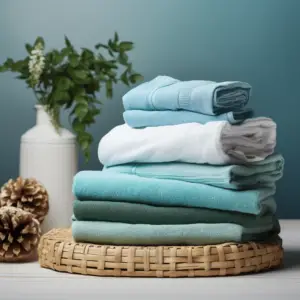Laundry Care for Sheets may feel inclined to cut corners if you have a lot of laundry and want to do it quickly. Knowing which items may be safely washed together is essential for managing laundry duties.
Towels and sheets are common household items that require regular cleaning so it’s of importance to understand how exactly the said items should be rightly washed.
Table of Contents
Can You Wash Sheets and Towels Together? Reasons You Shouldn’t

The direct answer to this query is no. It is not advisable to wash dirty sheets and towels together in the same load of laundry.
Sheets And Towels Are Made of Materials of Different Thickness
How long items take to dry in the dryer may depend on the thickness of the materials used to make them. Sheets and towels are often made of materials of different thicknesses. Towels, which are visibly thicker than linens, will dry more slowly. This implies that either towels won’t dry completely, which could result in mold growth or mildew, or sheets will be over-dried, which causes them to damage and reduce their lifespan.
Sheets and Towels Are Made of Different Materials
Laundry Care for Sheets may not seem important at first, towels are more likely to produce lint because they are primarily made of cotton. Your sheets may become covered in lint due to the difference in materials, altering their appearance and texture and endangering their lifeline. Mainly fresh towels generate much lint.
Sheets and Towels Require Different Temperatures
Since towels constantly come into contact with human skin cells and moisture, they should be washed in hot water. This helps eliminate any lingering bacteria. However, it’s not necessary to wash sheets in hot water. If you do, the more delicate fabric might be harmed.
Sheets and Towels Have Different Sizes
This is a crucial factor to consider because it influences drying time. A towel won’t dry out entirely if tightly wrapped in a sheet, leading to mildew and mold. Additionally, if towels or other clothing are caught in sheets, they aren’t rubbing up against other clothing, which is a crucial step in the washing process.
How Frequently Should You Wash Your Sheets?
Even though everyone perceives grimy linens differently, you should wash your sheets and pillowcases once a week. The average American waits 24 days before washing their linens! All the sweat, body oil, dead skin, spit, dust, and pet dander that inevitably clings to your sheets and pillowcases are eliminated by washing them.
While washing your linens in cold water is acceptable, you may want to think of using hot water after getting sick to help sterilize and remove germs.
How Frequently Should You Wash Your Towels?
Even though we may only use our bath towels briefly, the water they come into contact with can swiftly lead to health issues. For the sake of avoiding the germs and bacteria that flourish on moist surfaces, Laundry Care for Sheets is recommended that you clean your bath towels after using them a maximum of three times. Laundry Care for Sheets keep the towels you’re using in the bathroom; you might need to get a new one every other day. This is a result of the excessive humidity in the space.
How Frequently Should You Wash Other Items, Such as Dish Towels and Hand Towels?
The bath towel load frequently includes hand towels and dish towels. Always wash kitchen and dish towels in hot water because they contain a remarkable amount of germs and bacteria.
Dish towels are particularly hazardous. More than 17,000 bacteria are present in every square inch of your kitchen sink. Even the kitchen faucet, a reliable resting place for many dish towels, has over 13,000 germs.
Can You Wash Towels and Clothes Together?
You should always wash towels, bedding, and clothing separately, and you should always abide by the instructions on the tags of these things.
When you wash towels, sheets, and kitchen towels with your clothes, you risk contaminating your clothing with bacteria from those other items. Rashes or allergic reactions may occur if you have these compounds close to your skin or on your clothing for an extended period.
Is It Okay to Dry Sheets At a High Temperature?

Always use a low setting when washing bedding. Never heat them! The sheets’ fabric will be damaged and wrinkled by the high temperatures. Dry your linens gently since intense heat may cause your lovely cotton sheets to shrink.
What Must You Remember When Washing Sheets?
Check Labels
To ensure you follow the guidelines for washing your bedding, take the time to read every label carefully. Washing polyester blends in hot water is advised, but washing cotton sheets in hot water is not advised. To ensure a thorough, gentle wash, use lukewarm water as an alternative.
Make Sure to Wash Them at Least Once Every Two Weeks
Even while it can be tempting to put off doing the laundry occasionally, you should keep in mind that you probably spend considerably more time lying on your mattress than you do in all of your other clothes put together. Therefore, you need to clean and wipe down your bedding, but you don’t want it to get too dull or stained with detergent.
Fabrics Should be Sorted by Color
Like with clothing, certain linen colors can bleed onto softer hues. Because of this, it is vital that you sort your sheets by color before putting them in the washing machine.
What is the Best Temperature To Wash Towels?
One of the most incredible ways to ensure towels are clean and germ-free is to wash them on the hot cycle. Also, washing your sheets with hot water is crucial if you have a sick family member because you don’t want to spread the infection. It also aids in eliminating any musty smells that might have become stronger over time.
Washing your towels in hot water will make them smell fresh again if they have started to smell. Add your towels to the washing machine and use the hot cycle to wash them in hot water. Add one or two cups of fabric softener if you want your towel to feel and smell like a bed of roses.


